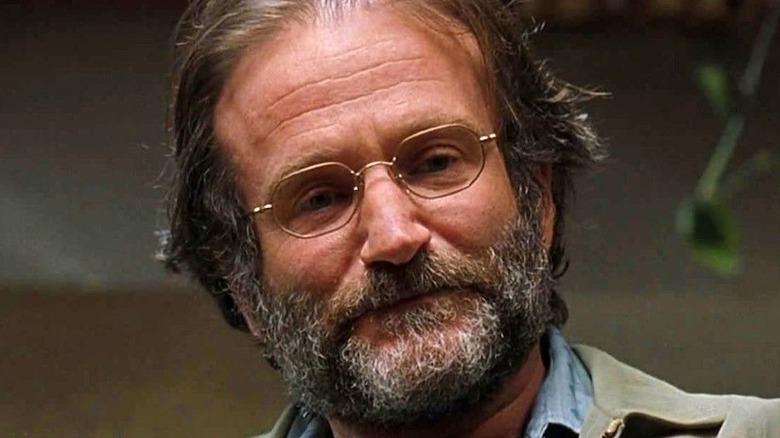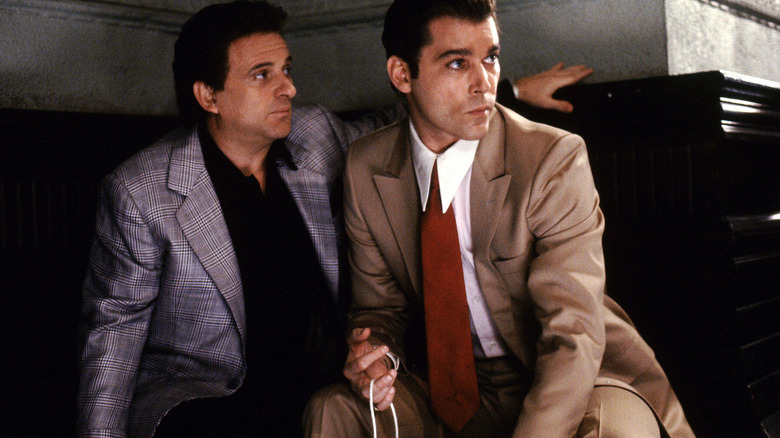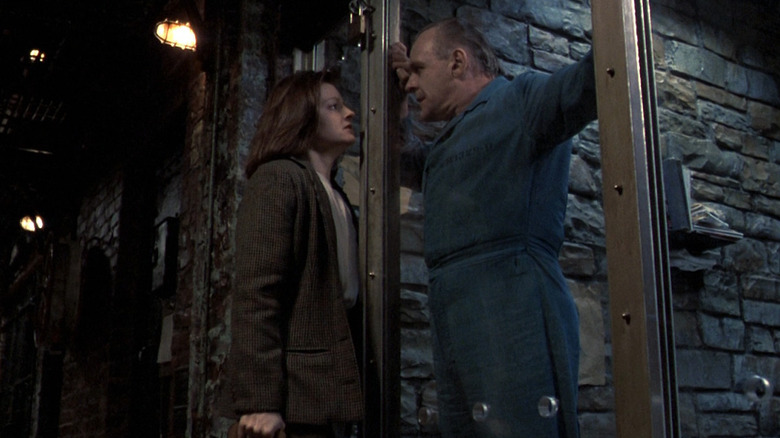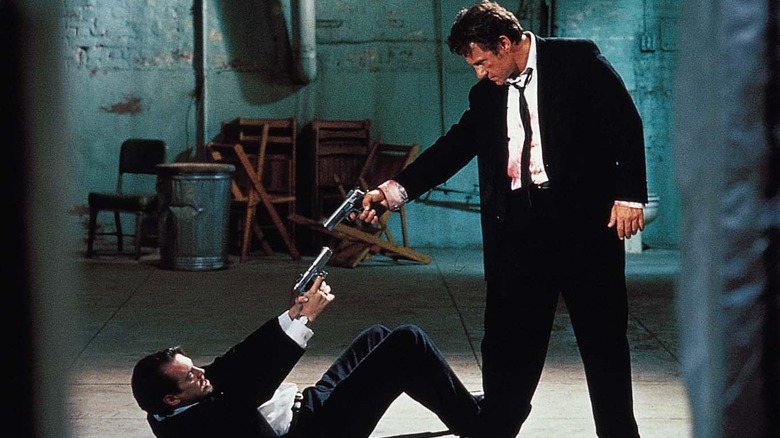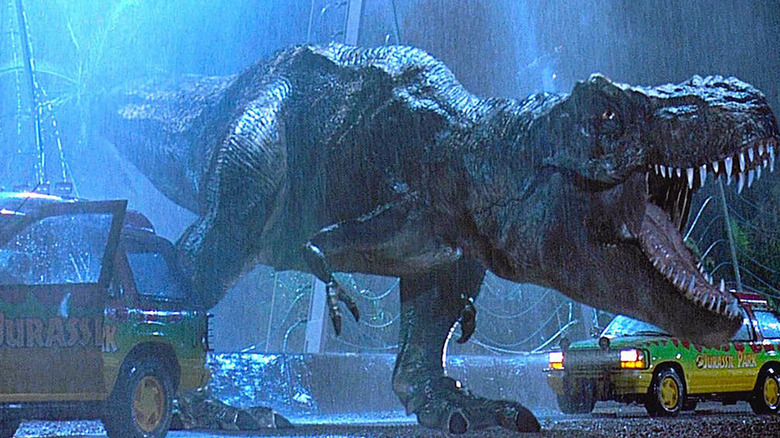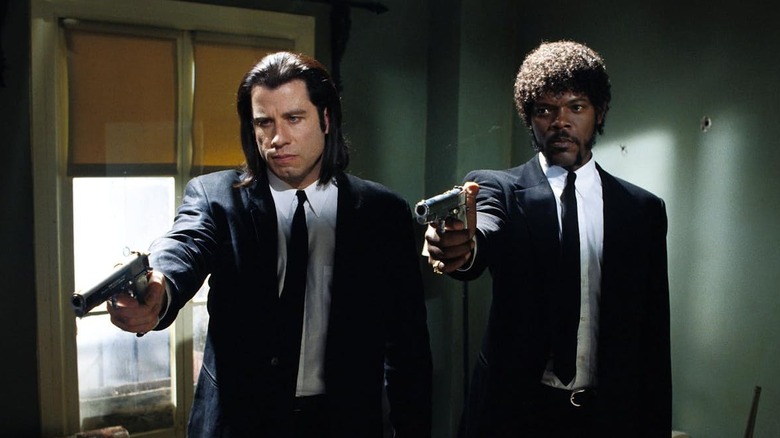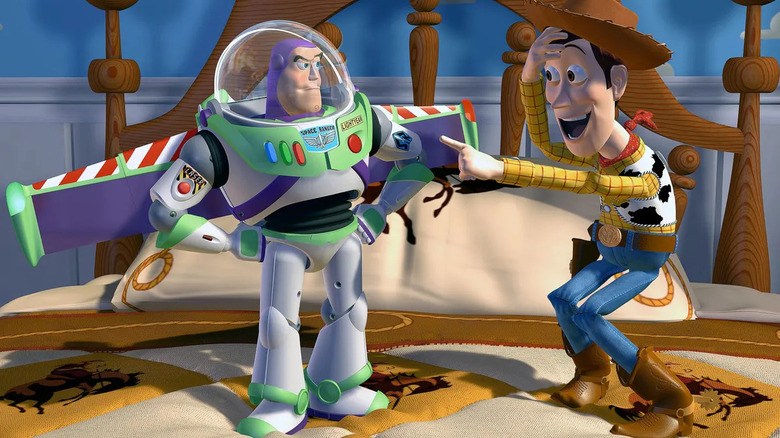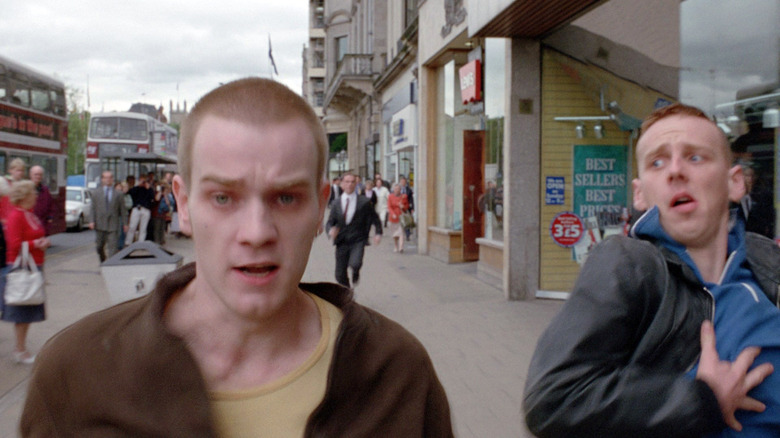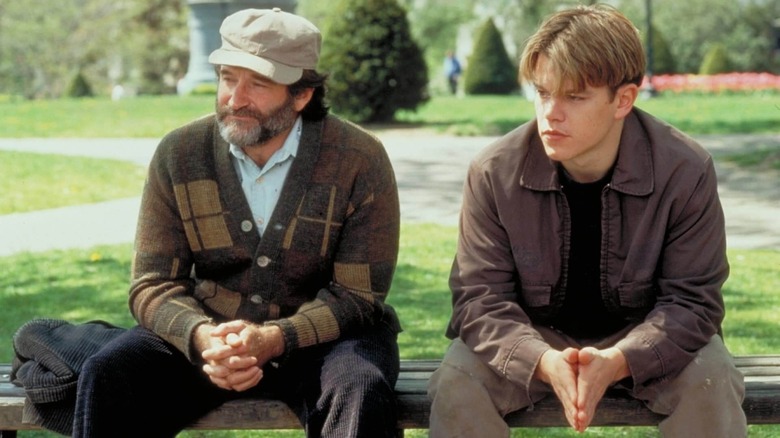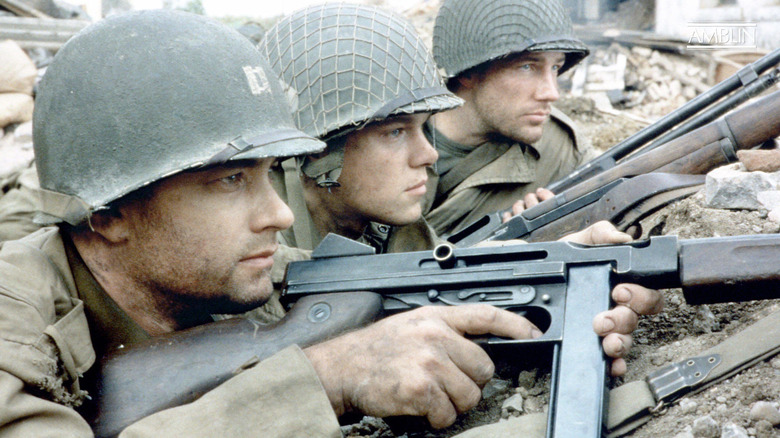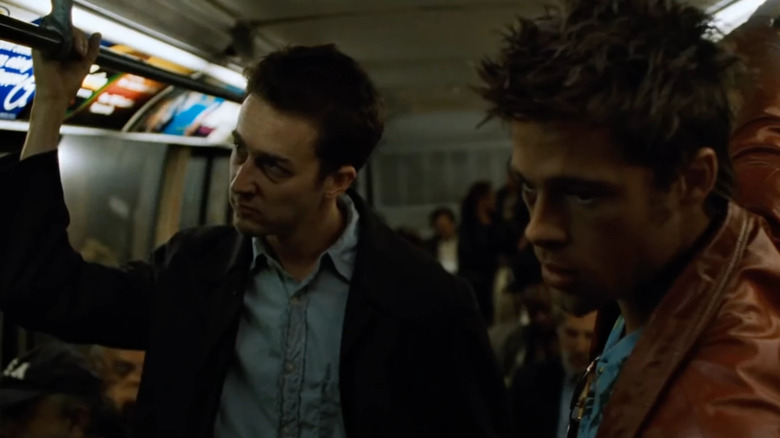The Best Movie Of Every Year Of The 1990s
An explosion of independent films, a rise in home viewing, greater diversity in front of and behind cameras, and increasingly advanced computer-generated visuals made the 1990s a pivotal period for Hollywood that led the industry to its modern, recognizable form. It seems like every year of that decade produced multiple game-changing classics. We decided to look at each year of the iconic decade and pick a winner from each.
But it was no easy task narrowing it down to just one. Countless worthy contenders, including "Beauty and the Beast," "Groundhog Day," "Schindler's List," "The Matrix," "The Sixth Sense," "The Big Lebowski," "The Thin Red Line," "Boys Don't Cry," "The Virgin Suicides," "Titanic," "Malcolm X," and "Casino," among many, many others (not to mention many top-notch foreign films of the decade), simply couldn't fit on this list. Believe us, we tried.
But at the end of the day, there's only one gold medal per contest. These are the best movies of every year of the 1990s. Warning: spoilers ahead!
1990 - Goodfellas
On the surface, it looks like "Taxi Driver," "Raging Bull," "Kings of Comedy," "Casino," "The Departed," "The Wolf of Wall Street" and "The Irishman" writer-director Martin Scorsese is stuck in a creative rut where he's only capable of producing gangster movies or at least something involving crime and cops-and-robbers tropes. But if he's this good at it, why change? "Goodfellas" might just be the greatest mob movie since the first two "Godfathers." Don't take our word for it. Here's what Roger Ebert had to say in his unsurprising four-star review: "Most films, even great ones, evaporate like mist once you've returned to the real world; they leave memories behind, but their reality fades fairly quickly. Not this film, which shows America's finest filmmaker at the peak of his form. No finer film has ever been made about organized crime — not even "The Godfather," although the two works are not really comparable."
The story, for those of you unfamiliar with it, follows Henry Hill (Ray Liotta) from a trouble-making childhood to getting involved with the Mafia. His two more experienced mentors and partners are James Conway (Robert De Niro, in one of his best roles) and Tommy DeVito (Joe Pesci being Joe Pesci, which is exactly what you'd want). It features plenty of what are now considered crime movie hallmarks, but the difference between "Goodfellas" and all the movies that tried to rip it off is that it just does it all so, so well.
1991 - The Silence of the Lambs
Any concerns that 1990s horror would simply continue the '80s tradition of paint-by-numbers slasher flicks were put to rest with 1991's "The Silence of the Lambs." The Best Picture winner (per IMDb), based on Thomas Harris' 1988 novel of the same name, follows Clarice Starling (Jodie Foster), a young, hotshot FBI detective, who asks imprisoned cannibal genius Hannibal Lecter (a terrific and terrifying Anthony Hopkins) for help catching an at-large serial killer named Buffalo Bill (Ted Levine).
One of the most surprising things about the film is how much Lecter, a cannibalistic serial killer, and Starling, a female detective, have in common. Roger Ebert wrote in his four-star review: "Both are ostracized by the worlds they want to inhabit... Both feel powerless... Both use their powers of persuasion to escape from their traps... And both share similar childhood wounds." It forms the basis of one of film history's unlikeliest, and most effective, onscreen duos. Both the screenplay and the performances are immensely powerful, as evidenced by the film's additional Oscar wins for Best Screenplay, Best Actor (Hopkins) and Best Actress (Foster).
Director Jonathan Demme also took home a well-earned trophy for his work. The Oscars don't always get it right, but they nailed this one. On Rotten Tomatoes, the critics consensus is glowing for this "smart, taut thriller." Although its harmful portrayal of a trans character hasn't aged well, it otherwise stands the test of time.
1992 - Reservoir Dogs
"A Few Good Men," "The Last of the Mohicans," and "Glengarry Glen Ross" all medaled in 1992, but Quentin Tarantino's feature-length debut, "Reservoir Dogs," takes the gold. If you haven't seen it, stop reading this immediately and come back once you have. The story follows six jewel thieves, all strangers to each other and identifiable only by codenames (based on colors, like "Mr. Brown" and "Mr. Blue"), who badly bungle a diamond heist. Interestingly, we don't see the event itself, but rather the moments preceding and immediately following it. It's a weird narrative choice, likely a product of the film's microscopic budget (per IMDb), but it works out well. As the world learned for the first time here and would never forget, Tarantino can make paint drying interesting. He's certainly capable of keeping you engaged with dialogue and a handful of gunshots.
The film isn't Tarantino's masterpiece by any means (which, honestly, makes its inclusion on this list even more impressive). Its aforementioned tiny budget had a role to play there, as well as the director's relative inexperience (his skills certainly evolved in his later projects). But it's still a sharp, slickly written, gleefully profane, twisty cinematic knockout that's well worth the time of any Tarantino fan, or anyone who simply loves great movies.
1993 - Jurassic Park
Holocaust drama "Schindler's List" and perfect comedy "Groundhog Day" came enviably close to capturing 1993's top prize, but we had to award Spielberg's groundbreaking adventure-thriller. One of the greatest blockbusters ever made, "Jurassic Park" does just about everything right in its tale of dinosaurs and corporate recklessness run amok. You all know the story. Alan Grant (Sam Neill) and Ellie Sattler (Laura Dern), two expert paleontologists, are flown out to inspect Dr. John Hammond's (Richard Attenborough) titular dinosaur-filled theme park on a remote Caribbean island. Chaos theory specialist Ian Malcolm (Jeff Goldblum) and Hammond's grandkids Tim (Joseph Mazzello) and Lex (Ariana Richards) tag along, while a skeleton crew of supporting staff (including Samuel L. Jackson's Ray Arnold) keep the lights on (for now) and Dennis Nedry (Wayne Knight) tries to steal the park's secrets for a shady competitor.
The famously dazzling visuals hold up remarkably well decades later, thanks to then-revolutionary computer-generated imagery that was masterfully mixed with animatronics and other practical effects. But the script is air-tight, too. Based on Michael Crichton's novel of the same name, the story has everything you want: unforgettable characters, sharp writing, and well-developed themes that tie it all together. When the heroes escape at the end, they — and we — have all learned a little something about treating nature with respect and accepting change. If the movie has any flaws whatsoever, they're vanishingly rare and pale in comparison to the asteroid-sized crater the film left on Hollywood.
1994 - Pulp Fiction
Between Best Picture winner "Forrest Gump" and "The Shawshank Redemption," picking the best film of 1994 was no easy task. But we had no choice but to give the nod to another Quentin Tarantino classic, "Pulp Fiction." It's almost impossible to poke holes in this one. The plot is complex and strange: three interlocking storylines, told just a little out of chronological order, that weave in and out of each other to paint a glitzy picture of L.A.'s criminal underworld. At their core, the stories are all quite simple, each focusing on a handful of core characters: a boxer (Bruce Willis) running from a mob boss after refusing to dive during a match he was paid to lose, the mobster himself (Ving Rhames), his wife (Uma Thurman), two hitmen (Samuel L. Jackson in his breakout role and John Travolta in his comeback one), and several other supporting characters.
Something like this will be made or broken by the execution. As its presence on this list indicates, and as you probably already know, the execution is where Tarantino shined. The Rotten Tomatoes critics consensus calls it "one of the most important films of the 1990s...a delirious post-modern mix of neo-noir thrills, pitch-black humor, and pop-culture touchstones." Hard to argue with that. From the masterful screenplay to the cinematography and performances, "Pulp Fiction" is a fresh blast of color and style that changed movies forever.
1995 - Toy Story
"Toy Story," Pixar's first Disney film, was supposed to simply showcase the possibilities of computer-generated animation to the film industry. It seems they made one of the greatest movies of all time entirely by accident. The story follows living toys whose purpose in life is to please whichever child owns them while hiding their sentience from humans. But the favorite toy status long enjoyed by cowboy Woody (Tom Hanks) is threatened when his kid, Andy, gets a Buzz Lightyear (Tim Allen) toy as a birthday present. We won't bother explaining it from there, because, as is the case with most of this list, you've almost certainly seen the movie enough times to quote the whole thing from memory.
Which means you know what it's doing here. "'Toy Story' creates a universe out of a couple of kid's bedrooms, a gas station, and a stretch of suburban highway," wrote Roger Ebert in his four-star review of the film. He continues, saying the film "achieves a three-dimensional reality and freedom of movement that is liberating and new. The more you know about how the movie was made, the more you respect it." "Toy Story" might look a little dated today, but that's only because it served as the giant's shoulders on which so many other beloved computer-animated films have stood. It has just as much magic and imagination today as it did when it was released. That's what animation — and cinema — is all about.
1996 - Trainspotting
"Fargo" and "Scream" were on the list of best films of '96, but the award ultimately goes to "Trainspotting" – Danny Boyle's drug thriller based on Irvine Welsh's 1993 novel of the same name. The film follows Mark Renton (Ewan McGregor) and his junkie pals as they scheme, manipulate, and backstab their way through mid-'90s Edinburgh, Scotland, in search of their next score. We often see the resulting horrors through a detached lens. It might seem strange for overdoses, criminal charges, fights, ruined relationships, and degrading moments to be depicted almost comedically, but it all makes sense: these are nothing but annoyances for our protagonists, who see every interaction as either a stepping stone or an obstacle to getting high. However, when tragedies pierce through this emotional barrier, it's truly haunting.
Like the heroin addiction it portrays, "Trainspotting" is a roller coaster. It's at different times heartbreaking, hilarious, thrilling, scary, and suspenseful. What's important is that whatever emotional strings it tries to pull, it succeeds. The Rotten Tomatoes critics consensus says as much: "A brutal, often times funny, other times terrifying portrayal of drug addiction in Edinburgh. Not for the faint of heart, but well worth viewing as a realistic and entertaining reminder of the horrors of drug use."
If you or anyone you know is struggling with addiction issues, help is available. Visit the Substance Abuse and Mental Health Services Administration Website or contact SAMHSA's National Helpline at 1-800-662-HELP (4537).
1997 - Good Will Hunting
Ben Affleck and Matt Damon's breakthrough film, which they wrote and directed themselves (per Boston Magazine), might seem a little predictable and cliché if you're just reading a plot summary. Will Hunting (Damon) is a brilliant but arrogant underachiever whose happy life as an MIT janitor is disrupted when he's ordered by the court to attend therapy sessions. Unwilling to participate at first, Hunting's friends (including Affleck's Chuckie) and therapist, Sean Maguire (Robin Williams), ultimately break through his defenses.
What sets "Good Will Hunting" apart is the fact that its parts outweigh the whole. It's so well crafted, with so many unforgettable scenes and performances and such impactful writing, that we remember it more for the little moments than the big picture. Roger Ebert said it best: "The outcome of the story is fairly predictable; so is the whole story, really. It's the individual moments, not the payoff, that make it so effective."
Who can forget "How 'bout them apples?" Or Sean's park bench speech to Will? Or when Chuckie, trying to shake Will out of his underachieving stupor, says, "'Cause tomorrow I'm gonna wake up and I'll be 50?" The movie doesn't try to outsmart you, twist your mind, or say anything particularly new or profound. Instead, it relies on humor and heart to break down your defenses and engage you in an intimate place.
1998 - Saving Private Ryan
You can make the argument that the war genre can be broken into a pre-"Saving Private Ryan" era and a post-"Saving Private Ryan" era. Before Spielberg's massive, star-studded epic about a small squad of American soldiers searching for the only surviving Ryan brother amidst the chaos of World War II, war films were often comparatively PG-13, patriotic affairs with depictions of violence that were either sanitized or brief.
But the opening 24-minute sequence depicting the Normandy landings at Omaha Beach, the greatest battle scene ever made, changed that forever. Spielberg used every tool in his extensive filmmaking kit to bring the harrowing event to life with such authenticity that, according to AP News, the Department of Veterans Affairs set up a hotline specifically to handle all the calls they were getting from combat vets whose PTSD was triggered by the film. If that's not a sign the scene did its job, nothing is.
But the rest of the film is worth watching too. Scenes depicting Mrs. Ryan collapsing on a porch as an Army official and a chaplain arrive to inform her that her sons have passed, a German prisoner using broken English to beg for his life, and a tearjerker ending are all heart wrenching, well-executed, and unforgettable. The film's ultimate loss to "Shakespeare in Love" at the following year's Oscars is considered to be one of the biggest award season upsets of all time, according to USA Today.
1999 - Fight Club
"The Matrix," "The Green Mile," "American Beauty," "The Blair Witch Project," "Office Space," and "The Sixth Sense" were all fighting for the top spot in one of film history's most underrated years. But at the end of the season, we gave the coveted rose to David Fincher's "Fight Club." The cult classic, based on the Chuck Palahniuk book of the same name, follows an unnamed depressed man (Edward Norton) whose stupor of mediocrity is disrupted when he meets a strange but exciting soap salesman, Tyler Durden (Brad Pitt). Under Durden's wing, Norton's character learns to buck social norms, fall in love, find meaning in squalor, and ultimately form the titular Fight Club, where other office drones take out their pent-up anger at their meaningless corporate lives with good old-fashioned bare-knuckle brawls. The end of the film is a head-twister, so we won't spoil it here.
Maybe it was inevitable that a movie filled with all this 30-something white guy angst and no one's face to throw it in would become a cult hit for frat boys. But don't let that rather regrettable reputation fool you: "Fight Club" is a thought-provoking, rewatchable classic fully worthy of that description. There are themes and twists involved here that can be discussed for days, but if you're simply on the fence about whether or not to watch it, trust us: it's a worthwhile wild ride.
